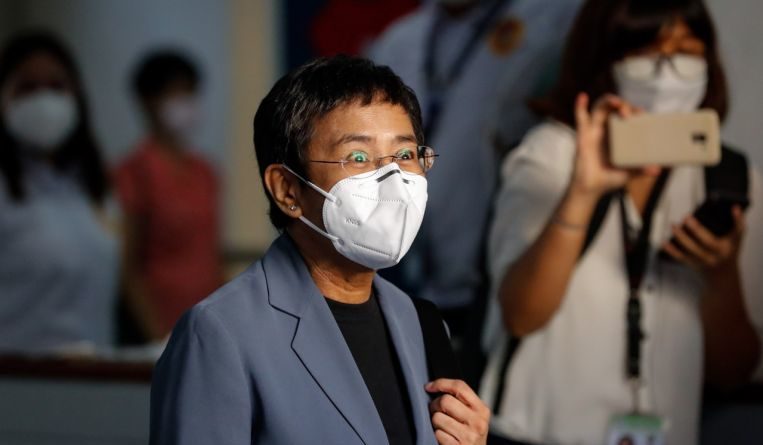MASS MEDIA-PRESS FREEDOM: Court finds prominent Philippine journalist and Duterte critic Maria Ressa guilty of cyber-libel
Maria Ressa was sentenced to up to six years in jail, but can post bail and appeal the ruling.PHOTO: EPA-EFE
Maria Ressa, editor of Rappler, one of the country’s top news websites, and her former researcher and writer Reynaldo Santos Jr were convicted for a story published in 2012.


They were sentenced to a jail term that ranged from six months to six years, but were allowed to post bail.
“This is a pivotal moment for the Philippines and a pivotal moment not just for our democracy but for the idea of what a free press means,” Ressa said at a news conference shortly after her sentencing.
“There’s the sword of damocles hanging over journalists’ heads,” she added. “It’s meant to make you doubt yourself, it’s meant to make you not push as hard because there will be consequences.”
Ms Caoilfhionn Gallagher, a human rights lawyer at Doughty Street Chambers and one of Ressa’s counsels, said: “This is a very dark day for the rule of law and freedom of expression in the Philippines. We have a situation where Maria Ressa was convicted on baseless charges, for an article she did not write, under a draconian law that did not exist when the article was published.”
The case stemmed from a story published on Rappler in 2012 that alleged ties between a Philippine businessman, Wilfredo D Keng, and a high court judge.
The case was filed initially in 2017, but dismissed by the National Bureau of Investigation because it was outside the statute of limitations.
In 2018, the justice department allowed the case to proceed to trial, extending the liability period for such cases from one to 12 years.
Ressa and her legal counsel noted that the controversial cyber-libel law did not exist at the time of publication, and was in fact only enacted four months after the story was written.
However, the justice department allowed the case to go ahead because the online article had been updated in February 2014 to correct a spelling error.




Cyber libel is a bailable offence and can go to the Court of Appeals in case of conviction.
“I’ve been the cautionary tale: be quiet or you’re next… That’s part of the reason why I have been targeted,” Ressa, 56, told Agence France-Presse. “It’s a chilling effect… not just to me and to Rappler, but to journalists and to anyone who asks critical questions.”
The International Press Institute said in a statement that the multiple charges brought against Ressa “are a transparent attempt to silence her and shut down Rappler in retaliation for its critical coverage of President Rodrigo Duterte and his administration.”
Both Ressa and Rappler – which has exposed corruption, extrajudicial killings and online troll armies – have faced a series of charges over the past year. Most of the claims relate to allegations over the news site’s finances.


In total, Rappler and its officers and staff have faced at least 11 government investigations and court cases.
Ressa has won international plaudits for her journalism and refusal to be cowed by what rights groups have described as judicial harassment.
She was among those named as Time person of the year in 2018, and won the 2018 Knight International Journalism award as well as a press freedom award given by the Committee to Protect Journalists.


 MANILA – A court on Monday (June 15) found one of the Philippines’ most prominent journalists guilty of cyber-libel, a verdict critics described as a “dark day” for journalism amid
MANILA – A court on Monday (June 15) found one of the Philippines’ most prominent journalists guilty of cyber-libel, a verdict critics described as a “dark day” for journalism amid 







